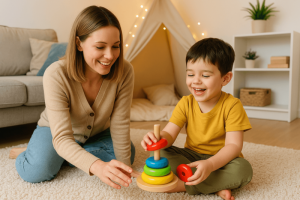Understanding and Managing Jealousy in Relationships
By Prapoorna M
Last Updated: March 4, 2024
Jealousy in relationships is like a silent whisper that can quickly turn into a roaring wave, affecting even the most secure partnerships. It’s a complex emotion, often brushed under the carpet, yet it holds the power to either make or break the bonds we cherish most. At its core, jealousy isn’t just about the fear of losing someone; it’s a mirror reflecting our deepest insecurities and desires.
Understanding and managing jealousy is not just about keeping negative emotions in check; it’s about nurturing the health and longevity of our relationships. When addressed with compassion and openness, navigating through jealousy can lead to deeper connections and a stronger foundation of trust between partners.
In today’s fast-paced world, where social media often blurs the lines between public and private life, jealousy finds new grounds to thrive. It’s not uncommon to feel uneasy seeing your partner interact with others online or in person. However, recognizing jealousy as a natural response to perceived threats to our relationships is the first step towards managing it constructively.
Book Relationship counselling now
Understanding Jealousy in Relationships
Jealousy, often painted in a negative light, is actually a natural and normal part of the human emotional spectrum. It’s a feeling that everyone experiences at one point or another, signaling deep-seated fears, insecurities, or desires. Understanding and managing jealousy in relationships is crucial, not just for the health of the partnership but for personal growth and happiness.
Definition of Jealousy and Its Normalcy in Human Emotions
Jealousy arises when a perceived threat looms over something valuable to us, particularly in the context of a romantic relationship. It’s rooted in the fear of loss or the fear of being replaced. Recognizing jealousy as a common emotion is the first step towards addressing it constructively. It’s a signal, not a sentence, indicating areas within us that may need attention or healing.
Causes of Jealousy in Relationships
Several factors contribute to feelings of jealousy within relationships, including:
- Insecurity: A lack of self-confidence or self-esteem can make one more susceptible to jealousy.
- Past Experiences: Previous relationships that ended due to infidelity or betrayal can leave scars that trigger jealousy in new relationships.
- Perceived Threats: This could be anything from a partner spending more time with someone else to receiving attention from others, sparking feelings of inadequacy or fear of loss.
Understanding these triggers is essential in addressing the root cause of jealousy rather than just its symptoms.
The Distinction Between Healthy and Unhealthy Jealousy
It’s important to differentiate between healthy and unhealthy jealousy. Healthy jealousy serves as a caution, prompting us to engage in conversations with our partners about needs, boundaries, and insecurities. It can strengthen the relationship by fostering openness and understanding. On the other hand, unhealthy jealousy is marked by control, possessiveness, and unreasonable demands. It stems from deep insecurities and can lead to toxic behavior patterns that undermine trust and mutual respect.
Embracing Jealousy as a Path to Growth
At Wellness Hub, we encourage individuals and couples to view jealousy not as an obstacle but as an opportunity for introspection and relationship enhancement. By understanding the causes of jealousy and learning to distinguish between its healthy and unhealthy manifestations, partners can navigate their way to a stronger, more secure union.
Navigating jealousy with compassion and empathy can transform it from a source of conflict to a catalyst for connection. Open communication about feelings and fears, reassured by mutual support and understanding, lays the foundation for a resilient relationship.
The Impact of Jealousy
Jealousy, while a common emotion in relationships, can cast long shadows on trust and communication, the very foundations upon which partnerships are built. Understanding the effects of jealousy on relationships is crucial for maintaining a healthy and fulfilling connection between partners.
Also Read: Rebuilding Trust In Relationship
How Jealousy Affects Trust and Communication
Trust is the bedrock of any relationship, and jealousy, when not managed properly, can erode this foundational element. It introduces doubt and suspicion, leading partners to question each other’s commitment and loyalty. Communication suffers as a result, with conversations that could be filled with understanding and empathy becoming charged with accusations and defensiveness.
The Potential for Jealousy to Lead to Negative Behaviors
Unchecked jealousy doesn’t just stop at affecting trust and communication; it can spiral into behaviors that are harmful to both individuals and the relationship. Snooping through a partner’s phone, obsessively checking their social media interactions, or constantly demanding reassurance are signs of jealousy turning into control, which can suffocate the freedom and individuality of both partners.
Personal Stories: The Real-life Effects of Unchecked Jealousy
Imagine Sarah and Alex, a couple who seemed to have it all from the outside. However, Alex’s jealousy over Sarah’s close friendship with a colleague began to create fissures in their relationship. Alex’s constant questioning and demands for reassurance led Sarah to feel trapped and misunderstood, pushing her away. This scenario illustrates how unchecked jealousy can transform minor insecurities into major relationship crises.
Another story comes from Rahul, who admitted to regularly checking his partner’s phone due to a deep-seated fear of being abandoned. This habit, rooted in past experiences of betrayal, not only invaded his partner’s privacy but also highlighted his lack of trust, leading to numerous arguments and a gradual emotional disconnect between them.
Navigating Through the Storm
These stories underscore the importance of addressing jealousy head-on, not by giving in to the urge to control or monitor, but by fostering open and honest communication. At Wellness Hub, we advocate for recognizing the signs of unhealthy jealousy and taking proactive steps to build a relationship where trust and understanding can flourish anew.
Jealousy doesn’t have to be the villain in your love story. With the right approach, it can be transformed from a source of conflict to a catalyst for growth, bringing partners closer as they navigate these challenges together. Remember, every relationship faces its tests, but it’s how you come through them that defines your bond.
Recognizing Your Feelings
Understanding what sparks jealousy in relationships begins with a journey inward. It’s about facing the question: What causes jealousy in relationships? The answer often lies within our own fears, insecurities, and past experiences that shape how we perceive threats to our bonds.
Read more How to boost your self-esteem after a breakup?
Encourage Self-Reflection and Identification of Personal Insecurities
Self-reflection is a powerful tool in recognizing and understanding the insecurities that fuel our jealousy. It requires honesty and courage to look within and ask ourselves why certain actions or situations trigger feelings of jealousy. Is it a lack of self-esteem, fear of abandonment, or unresolved issues from past relationships? Identifying these triggers is the first step toward managing them.
Discuss the Importance of Acknowledging Jealousy Without Judgment
Acknowledging feelings of jealousy without self-criticism is crucial. Jealousy is a natural emotion, and feeling it does not make you weak or flawed. The key is how you respond to these feelings. By accepting jealousy as a part of your emotional repertoire, you can approach it with curiosity rather than condemnation. This shift in perspective opens the door to constructive dialogue with yourself and your partner.
Strategies for Managing Jealousy
Armed with an understanding of your feelings, the next step is to explore strategies for managing jealousy in a way that strengthens your relationship rather than undermines it.
Communication Techniques to Address Jealousy
Open, honest communication is vital. It involves expressing your feelings without placing blame. Use “I” statements to convey your emotions, such as “I feel jealous when…” This invites your partner into your emotional world, fostering empathy and understanding. Listening is equally important. Encourage your partner to share their thoughts and feelings, creating a mutual dialogue where both of you feel heard.
Know more about on Learn to manage your Stress
Building Trust and Security Within the Relationship
Trust is the antidote to jealousy. Building trust requires consistency, reliability, and openness. Small actions, like keeping promises and showing appreciation, can fortify trust over time. Establishing a secure foundation in your relationship makes it easier to manage moments of jealousy.
Self-Help Strategies: Journaling, Therapy, Setting Boundaries
Journaling offers a private space to process your feelings, providing clarity and insight. Therapy, whether individual or couples’, can be an invaluable resource in navigating jealousy, offering professional guidance tailored to your relationship. Setting healthy boundaries is also crucial. Discuss what feels comfortable for both of you, respecting each other’s needs and limits.
Improving Your Relationship Through Understanding Jealousy
Jealousy, often seen as a negative force in relationships, holds within it the seeds for profound relationship growth and enrichment. By shifting our perspective and approach, we can transform jealousy from a source of contention to a catalyst for deeper connection and understanding.
Transforming Jealousy into Opportunities for Relationship Growth
The key to converting feelings of jealousy into growth opportunities lies in using these moments as a mirror, reflecting back areas in our relationship and within ourselves that need attention or healing. Recognizing and addressing the root causes of jealousy can lead to meaningful conversations about needs, desires, and fears, paving the way for a stronger bond and increased intimacy.
For instance, feelings of jealousy can highlight the need for more quality time together or reassurance of each other’s commitment. By addressing these needs directly, couples can enhance their emotional connection and resilience against future challenges.
Know more about the Why saying No in a Relationship is a Good thing?
The Role of Empathy and Open Dialogue
Empathy and open dialogue are crucial components in navigating jealousy in a healthy and constructive manner. Empathy allows us to see the world from our partner’s perspective, understanding the emotions behind their actions or concerns. This understanding fosters compassion and patience, reducing defensive reactions and promoting a supportive environment where both partners feel valued and heard.
Initiating open dialogues about jealousy requires courage and vulnerability. It involves discussing feelings without blame and expressing needs clearly. This level of communication fosters trust and understanding, essential ingredients for a thriving relationship.
Also read: Effect of love and compassion in our life
When to Seek Professional Help
While navigating jealousy within a relationship through open communication and mutual understanding is often effective, there are instances when external support becomes necessary. Recognizing when to seek professional help is a crucial step in preserving the health and happiness of your relationship.
Signs That You or Your Partner May Benefit from Speaking to a Therapist
Certain indicators suggest that jealousy is reaching a point where professional intervention may be beneficial:
- Persistent Jealousy: When feelings of jealousy become constant and overwhelming, affecting daily life and happiness.
- Trust Issues: If jealousy has eroded trust to the extent that normal interactions become suspect.
- Communication Breakdown: When attempts at communication lead to frequent arguments or if discussing feelings of jealousy feels unsafe or impossible.
- Impact on Mental Health: If jealousy or the fear of losing your partner causes anxiety, depression, or other mental health concerns.
- Controlling Behaviors: When jealousy leads to controlling the partner’s actions, such as dictating who they can see, where they can go, or checking their phone without consent.
Know more about Marriage Counselling: When should you consider it? Everything you need to know
How Couples Therapy or Individual Counseling Can Provide Strategies for Managing Jealousy
Therapy offers a safe and neutral space to explore the roots of jealousy and how it affects the relationship. A therapist can help individuals and couples:
- Understand the Underlying Causes: Professionals can guide you to uncover the deeper issues fueling jealousy, such as past traumas, insecurities, or unresolved personal issues.
- Develop Healthy Communication Skills: Therapists can introduce techniques and exercises to improve how you express feelings and listen to each other, facilitating a deeper understanding and empathy.
- Build Trust and Security: Counseling can provide strategies to rebuild trust and security within the relationship, essential for moving beyond jealousy.
- Individual Growth: For some, individual therapy may be recommended to work on self-esteem issues or to process past experiences that contribute to feelings of jealousy.
At Wellness Hub, we recognize the bravery it takes to seek help and the strength it demonstrates. Admitting that you need support is not a sign of weakness but a commitment to the health of your relationship and your personal well-being. Whether through couples therapy or individual counseling, gaining perspective and tools to manage jealousy can open the door to a more secure, trusting, and fulfilling partnership.
Read more about How to Find the Right Marriage Counsellor?
Signs You May Need Professional Help
| Sign | Brief Description | Recommended Action |
|---|---|---|
| Persistent Jealousy | Feeling jealous more days than not, affecting your peace of mind and relationship | Seek individual counseling |
| Trust Issues | Lack of trust affecting daily interactions and causing constant doubt | Consider couples therapy |
| Communication Breakdown | Inability to discuss feelings of jealousy without arguments or misunderstandings | Engage in communication workshops |
| Impact on Mental Health | Jealousy leading to anxiety, depression, or other mental health concerns | Consult a mental health professional |
| Controlling Behaviors | Actions aimed at monitoring or controlling a partner’s behavior or interactions | Explore individual or couples therapy |
| Emotional Distress | Jealousy causing significant distress, sadness, or anger | Seek support from a therapist |
| Deterioration of Relationship | The relationship suffers due to unresolved jealousy and trust issues | Engage in relationship counseling |
| Insecurity | Deep-seated feelings of inadequacy or not being ‘enough’ for your partner | Seek individual therapy to build self-esteem |
Practical Tips and Exercises
Managing jealousy within a romantic relationship requires not just understanding and communication but also practical strategies and exercises that couples can implement. These tools are designed to help individuals process their feelings constructively and engage with their partners to foster a deeper, more secure connection.
Mindfulness and Emotional Freedom Technique (EFT)
Mindfulness is a powerful tool for managing jealousy. It involves being present in the moment, observing your feelings without judgment. When jealousy arises, take a deep breath and acknowledge the emotion. Ask yourself what’s triggering this feeling. Is it a comment, a situation, or perhaps an insecurity within yourself? Mindfulness allows you to step back and observe your emotions without being overwhelmed by them.
The Emotional Freedom Technique (EFT), also known as tapping, is another effective method for dealing with intense emotions like jealousy. EFT combines cognitive therapy with manual tapping on specific acupuncture points. This process can help reduce the emotional impact of memories and incidents that trigger jealous feelings, aiding in emotional regulation and reducing stress.
Mindfulness Exercises for Managing Jealousy
| Exercise | How It Helps | Frequency & Duration |
|---|---|---|
| Deep Breathing | Reduces immediate emotional intensity | 5 minutes, as needed |
| Observing Thoughts | Encourages non-judgmental awareness | 10 minutes daily |
| Gratitude Journaling | Shifts focus from jealousy to appreciation | Daily, at least 5 minutes |
| Mindful Walking | Promotes present-moment awareness | 15-30 minutes, a few times a week |
| Positive Affirmations | Builds self-esteem and counters negative thoughts | Morning and evening, 5 minutes |
| Emotional Freedom Technique (EFT) | Helps manage and reduce the emotional response to triggers | When feeling overwhelmed, 5-10 minutes |
| Listening to Calming Music | Soothes the mind and reduces stress levels | As needed, preferably daily |
| Visual Imagery | Encourages relaxation and positive mental states | 10 minutes, when feeling stressed |
Engaging with Your Partner
Open, honest communication is essential in addressing jealousy. Here are some practical tips for engaging with your partner:
- Scheduled Check-ins: Establish regular times to discuss your feelings and concerns. This can be a safe space to share any triggers of jealousy and discuss how to address them together.
- Use “I” Statements: When discussing your feelings, use “I” statements to express how you feel without blaming your partner. For example, “I feel insecure when you spend a lot of time with your coworker, and I need reassurance of our connection.”
- Establish Boundaries: Together, define what is and isn’t comfortable for both of you. Setting clear boundaries helps prevent misunderstandings and provides a framework within which both partners feel secure.
- Share Appreciations: Regularly express what you appreciate about each other. This practice strengthens the emotional bond and reassures both partners of their value and importance in the relationship.
Exercises to Build Trust and Security
- Gratitude Journaling: Both partners can keep a daily journal of things they appreciate about each other and the relationship. Sharing these can boost positivity and reduce feelings of insecurity.
- Trust-building Activities: Engage in activities that build trust, such as trust falls or blindfolded guidance games. These exercises, while simple, can reinforce the trust and teamwork in your relationship.
- Counseling or Workshops: Participating in couples workshops or counseling can provide additional tools and insights for strengthening your relationship.
Conclusion
Navigating through the complexities of jealousy in relationships is a journey that demands understanding, patience, and active engagement. In our exploration, we’ve highlighted the natural occurrence of jealousy, its underlying causes, and its profound impact on the dynamics of a relationship. Recognizing one’s feelings, fostering open communication, and adopting practical strategies are pivotal steps in transforming jealousy from a divisive force into a catalyst for growth and deeper intimacy. These approaches underscore the importance of self-reflection, empathy, and dialogue in overcoming the challenges jealousy presents, as well as the value of seeking professional guidance when needed.
Wellness Hub is dedicated to supporting individuals and couples on their journey to healthier relationships and enhanced well-being. By providing resources, advice, and tools, we aim to empower you to navigate jealousy constructively, ensuring your relationships not only endure but flourish. Understanding and managing jealousy is essential for sustaining a loving, secure partnership. Let Wellness Hub guide you toward fostering stronger connections and achieving personal growth, as we believe that through confronting challenges with wisdom and compassion, every relationship can reach its fullest potential.
Frequently Asked Questions:
1. Understanding the Triggers: Why Does Jealousy Spark?
Jealousy often flares when insecurity, fear of abandonment, past betrayals, or trust issues simmer beneath the surface. Recognizing these emotional triggers is the first step towards taming jealousy and fostering a secure, trusting connection.
2. From Jealousy to Harmony: Keys to Overcoming It
Conquering jealousy requires a multi-pronged approach:
- Open Communication: Talk openly and honestly with your partner. Share your feelings without blame, truly listen to their perspective, and work together to identify and address your concerns.
- Self-Reflection: Explore the roots of your jealousy. Are there past experiences or insecurities fueling it? Addressing these underlying issues can empower you to manage your emotions healthily.
- Trust-Building Exercises: Engage in activities that reinforce trust and strengthen your bond. This could involve spending quality time together, actively listening to each other, and demonstrating consistent commitment.
- Mindfulness & Therapy: Mindfulness practices like meditation can help you stay present and manage anxious thoughts. If jealousy feels overwhelming, consider seeking professional guidance from a therapist.
3. Embracing the Healthy Side: Can Jealousy Be Good?
While unchecked jealousy can be harmful, when managed constructively, it can even benefit your relationship:
- Spark for Growth: Jealousy can act as a signal that certain needs aren’t being met or insecurities exist. By communicating openly and addressing these issues, you can strengthen your bond and build a more fulfilling relationship.
- Communication Catalyst: Jealousy can prompt crucial conversations about boundaries, expectations, and needs. This open dialogue can foster understanding, empathy, and deeper connection.
4. Practical Tools for Taming the Jealousy Monster:
Here are some handy tools to manage jealousy:
- Journaling: Write down your feelings and explore their triggers. This self-reflection can provide valuable insights.
- Mindfulness: Practice meditation or deep breathing exercises to stay present and manage anxiety in the moment.
- Emotional Freedom Technique (EFT): This tapping technique can help release negative emotions associated with jealousy.
- Trust-Building Activities: Plan activities that build trust and reinforce your bond, like shared hobbies or intimate conversations.
5. Seeking Support: When is Professional Help Needed?
Consider seeking professional help if:
- Jealousy is impacting your mental health or causing distress.
- It leads to controlling behaviors or unhealthy communication patterns.
- You struggle to manage your emotions despite self-help efforts.
A therapist can offer personalized strategies and support to navigate jealousy constructively and nurture a healthy, fulfilling relationship.
6. What are some practical exercises to manage jealousy?
Practical exercises include journaling to explore your feelings, practicing mindfulness to stay present and reduce anxiety, and using the Emotional Freedom Technique (EFT) to manage intense emotions. Engaging in trust-building activities with your partner can also be beneficial.
7. How does Wellness Hub help individuals and couples deal with jealousy?
Wellness Hub offers resources, advice, and support for individuals and couples navigating jealousy in their relationships. Through articles, counseling recommendations, and practical tips, Wellness Hub aims to empower people to address jealousy constructively and enhance their relationship dynamics.
8. What communication techniques can help address jealousy in a relationship?
Effective communication techniques include using “I” statements to express feelings without accusing your partner, actively listening to your partner’s perspective, and discussing boundaries and insecurities openly. Regular check-ins can also help partners stay connected and address any concerns before they escalate.
9. How can mindfulness help in managing jealousy?
Mindfulness helps by allowing individuals to observe their jealous thoughts and feelings without judgment. This practice encourages a more reflective rather than reactive response to jealousy, enabling individuals to understand their emotions better and communicate their feelings in a calm and collected manner.
10. Why is setting boundaries important in dealing with jealousy?
Setting boundaries is crucial as it helps define what is acceptable and what isn’t within a relationship, providing a sense of security and respect between partners. Clear boundaries can prevent misunderstandings and reduce feelings of jealousy by establishing a mutual agreement on behavior and interactions with others.
About the Author:
Prapoorna Mangalampalli
M.Sc., M.A., (Dual Masters in Psychology & English) – Counselor (6+ years of experience)
Prapoorna armed with a passionate dedication fueled by dual Master’s degrees in Psychology and English, Prapoorna sheds light on and elevates human experiences. Over 6+ years of experience fuel her insightful approach to counseling, offering profound empathy and guidance across diverse areas like online, marital, relationship, child, family, and career counseling.
At Wellness Hub, she thrives in a team environment that values innovation, compassion, and achieving results for their clients.
Connect with Prapoorna to learn how she can help you or your loved one find their voice and build a brighter future.
Book your Free Consultation Today
Parent/Caregiver Info:
Client’s Details:
* Error Message






